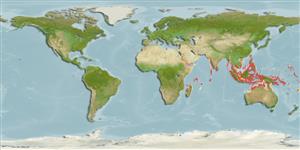>
Siluriformes (Catfishes) >
Ariidae (Sea catfishes) > Ariinae
Etymology: Arius: Greek, arios, areios = dealing with Mars, warlike, bellicose (Ref. 45335).
Environment: milieu / climate zone / depth range / distribution range
Ökologie
seewasser; brackwasser demersal. Tropical
Indo-West Pacific: Pakistan east to Thailand, then south to the Philippines and Indonesia.
Size / Gewicht / Alter
Maturity: Lm ? range ? - ? cm
Max length : 32.0 cm TL Männchen/unbestimmt; (Ref. 3290); common length : 12.0 cm TL Männchen/unbestimmt; (Ref. 3290)
Found in marine waters, as well as in estuaries and tidal rivers. Feeds mainly on invertebrates. The sharp dorsal and pectoral fin spines can inflict painful wounds. Sold mostly fresh in markets. Also caught with dipnets.
Life cycle and mating behavior
Geschlechtsreife | Fortpflanzung | Ablaichen | Eier | Fecundity | Larven
Jayaram, K.C., 1984. Ariidae. In W. Fischer and G. Bianchi (eds.) FAO species identification sheets for fishery purposes. Western Indian Ocean fishing area 51. Vol. 1. FAO, Rome. pag. var. (Ref. 3290)
IUCN Rote Liste Status (Ref. 130435: Version 2024-1)
Bedrohung für Menschen
Traumatogenic (Ref. 58010)
Nutzung durch Menschen
Fischereien: kommerziell
Tools
Zusatzinformationen
Download XML
Internet Quellen
Estimates based on models
Preferred temperature (Ref.
123201): 27.7 - 29.3, mean 28.8 °C (based on 1957 cells).
Phylogenetic diversity index (Ref.
82804): PD
50 = 0.5000 [Uniqueness, from 0.5 = low to 2.0 = high].
Bayesian length-weight: a=0.00794 (0.00381 - 0.01658), b=3.08 (2.91 - 3.25), in cm total length, based on LWR estimates for this (Sub)family-body shape (Ref.
93245).
Trophic level (Ref.
69278): 3.5 ±0.37 se; based on food items.
Widerstandsfähigkeit (Ref.
120179): hoch, Verdopplung der Population dauert weniger als 15 Monate. (Preliminary K or Fecundity.).
Fishing Vulnerability (Ref.
59153): Low vulnerability (22 of 100).
